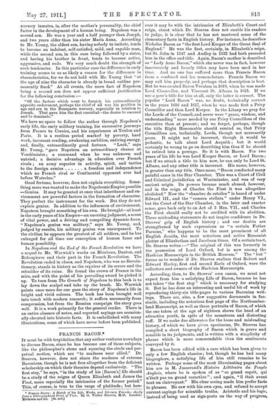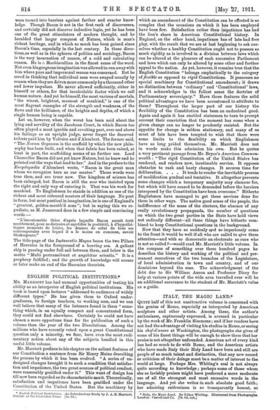FRANCIS BACON.* IT must be with trepidation that any author
ventures nowadays to discuss Bacon, since he has become one of those subjects, like the philosopher's stone and squaring the circle and per- petual motion, which are "to madness near allied." Dr. Steeves, however, does not share the madness of extreme Baconians, though he is not free altogether from the deficient scholarship on which their theories depend exclusively. " The first step," he says, "in the study of his 'Bacon's] life should be a study of the reigns of Queen Elizabeth and James the First, more especially the intricacies of the former period." This, of course, is true to the verge of platitude ; but how-
• Francis Bacon : A Sketch of his Life, Works, and Literary Friends ; chiefly from a Bibliographical Point of View. By G. Walter Steeves, M.D. London: Methuen o.od Co. Os. wt.)
ever it may be with the intricacies of Elizabeth's Court and reign, about which Dr. Steeves does not enable his readers to judge, it is clear that he has not mastered some of the elementary facts in English history. For instance, he describes Nicholas Bacon as " the first Lord Keeper of the Great Seal of England." He was the first, certainly, in Elizabeth's reign, but St. John in 1547 and Audley in 1532 had both preceded him in the office and title. Again, Bacon's mother is described as " Lady Anne Bacon," which she never was in fact, however inaccurately and loosely titles may have been used in her time. And no one has suffered more than Francis Bacon from a confused and lax nomenclature. Francis Bacon we may call him properly, and perhaps that description is best. But he was created Baron Verulam in 1618, when he was made Lord Chancellor, and Viscount St. Albans in 1621. If we use a peer's title for him at all, only the latter is correct. The popular " Lord Bacon " was, no doubt, technically correct in the years 1616 and 1617, when ho was made first a Privy Councillor and then Lord Keeper. In the Litany we pray for the Lords of the Council, and never were " grace, wisdom, and understanding " more needed by our Privy Councillors of the executive than at present ; and we forget, perhaps, though the title Right Honourable should remind us, that Privy Councillors are, technically, Lords, though not necessarily peers. It might not be incorrect, though it would be pedantic, to talk about Lord Asquith ; but it would certainly be wrong to go on describing him thus if he should be retired into a peerage. So it is with Bacon. For two years of his life he was Lord Keeper Bacon, or Lord Bacon ; but if we attach a title to him now, he can only be Lord St. Albans, and any other title is incorrect. His name, however, is greater than any title. Once more, " Bacon conducted many painful cases in the Star Chamber. This was a Court of Civil and Criminal jurisdiction at Westminster, and was of very ancient origin. Its powers became much abused, however, and in the reign of Charles the First it was altogether abolished." Now the " chambre de estoiles " is heard of under Edward III., and the " camera stellata " under Henry VI., but the Court of the Star Chamber, in the later and exacter sense, goes back only to an Act of 3 Hen. VII., and Charles the First should really not be credited with its abolition. These misleading statements do not inspire confidence in Dr. Steeves' grip of English history ; and our doubts are strengthened by such expressions as " a. certain Father Parsons," who happens to be the most prominent of all English Jesuits, the most notorious and active Romanist plotter of Elizabethan and Jacobean times. Of a certain tract, Dr. Steeves writes :—" The original Of this was formerly in the possession of Lord Oxford, but is now among the Harleian Manuscripts in the British Museum." The " but " forces us to wonder if Dr. Steeves realizes that Robert and Edward Harley, first and second Earls of Oxford, were the collectors and owners of the Harleian Manuscripts.
According, then, to Dr. Steeves' own canon, we must not expect from him a satisfying Life of Bacon, because be has not taken " the first step " which is necessary for studying it. But he has done an interesting and useful bit of work by reproducing thirty-six title-pages to various Baconian writ- ings. There are, also, a few suggestive documents in fac- simile, including the notorious first page of the Northumber- land Manuscript, as well as three portraits of Bacon, of which the one taken at the age of eighteen shows the head of an attractive youth, in spite of the monstrous and distorting ruff. If we make due allowance for the loose and misleading history, of which we have given specimens, Dr. Steeves has compiled a short biography of Bacon which is grave and sensible in its judgments, and is written with a simplicity of phrase which is more commendable than the sentiments conveyed by it.
Bacon has been edited with a care which has been given to only a few English classics ; but, though he has had many biographers, a satisfying life of him still remains to be written. Perhaps some of the most illuminating pages about him are in M. Jusserand's Histoire Litteraire du Peuple Anglais, where he is spoken of as " ce grand esprit, qui n'etait pas un grand camctere " ; and again, "il etait avant tout un clairvoyant." His clear seeing made him prefer facts to phrases. He saw with his own eyes, and refused to accept current sayings for scientific truths. Aristotle and his logic, instead of being used as sign-posts on the way of progress,
were turned into barriers against farther and exacter know- ledge. Though Bacon is not in the first rank of discoverers,
and certainly did not discover inductive logic, yet he has been one of the great stimulators of modern thought, and he heralded that larger conquest of Nature, which is man's richest heritage, and in which so much has been gained since Bacon's time, especially in the last century. In these direo- tions,as well as in the spheres of politics and sociology, Bacon is the very incarnation of reason, of a cold and calculating
reason. He is a Machiavellian in the finest sense of the word. Not even his gorgeous imagination was allowed to run away with
him where pure and impersonal reason was concerned. But he erred in thinking that individual men were swayed usually by reason when they are driven more commonly bya thousand other
and lower impulses. He never allowed sufficiently, either in himself or others, for that incalculable factor which we call human nature. And yet be himself, the most various of mortals, " the wisest, brightest, meanest of mankind," is one of the most flagrant examples of the strength and weakness, of the flaws and the brilliance, of the heights and depths, of which a single human being is capable.
Let us, however, when the worst has been said about the lying and servility of the Jacobean Court, in which Bacon too often played a most ignoble and revolting part, over and above his failings as an upright judge, never forget the deserved tribute paid him by Voltaire and d'Alembert. The former said, " The Norum Organism is the scaffold by which the new philo- sophy has been built, and when that fabric has been raised, at least in part, the scaffolding seems of no further use. Lord Chancellor Bacon did not yet know Nature, but he knew and he pointed out the ways that lead to her." And in the preface to the Encyclopedia d'Alembert wrote, " Bacon is the great man whom we recognize here as our master." Those words were true then, and are truer now. The kingdom of science has been enlarged, but Bacon is still the seer who insisted upon the right and only way of entering it. That was his work for mankind. To Englishmen he stands in addition as one of the richest and most coloured masters of their language. No poet in form, but most poetical in imagination, he is one of England's " greatest, golden-mouth'd sons "; but in saying this we re- pudiate, as M. Jusserand does in a few simple and convincing words :-
" L'insoutenable these d'apres laquelle Bacon aurait ecrit secretement, pour se distraire et mystifier In posterite, a d'hypothe- tiques moments de loisirs, lea drames de celni de tons sex contemporains avec legnel it a le moires en commun, savoir Shakespeare."
The title-page of the Inatauratio Magna bears the two Pillars of Hercules in the foreground of a heaving sea. A gallant ship is passing under full sail between them, and below is the motto "Multi pertransibunt et augehitur scientia." It is a prophecy fulfilled ; and the growth of knowledge will sooner or later make an end of the Baconian theorists.











































 Previous page
Previous page